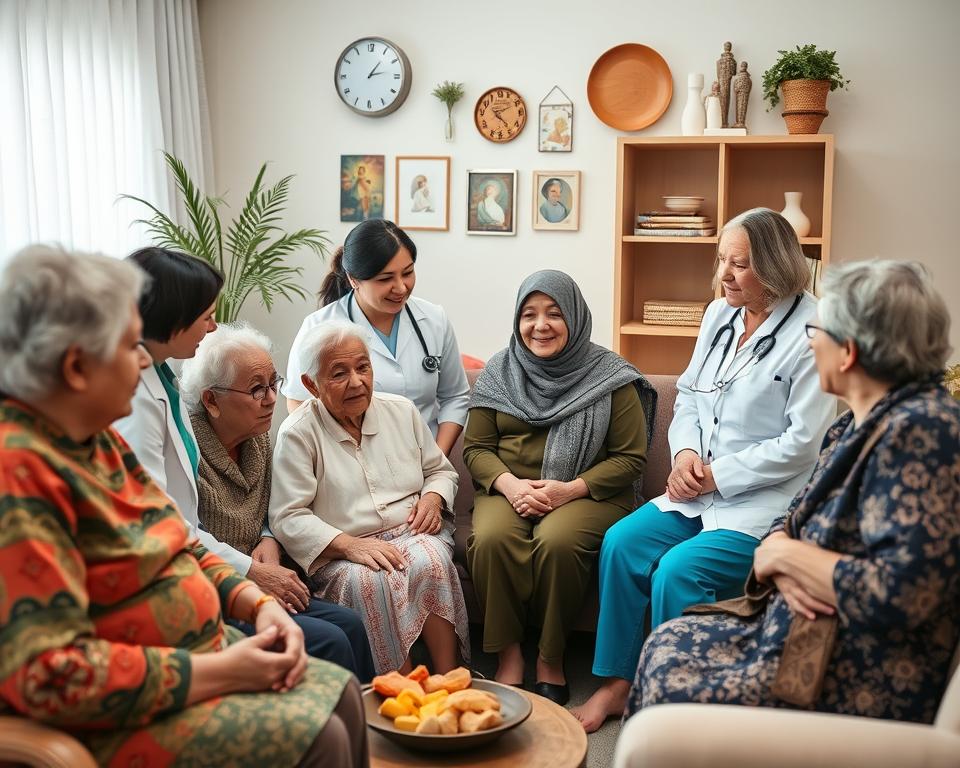Canada’s aging population and growing immigrant diversity bring new challenges and chances for Ontario’s home care. It’s key to grasp the importance of cultural understanding, diversity in healthcare, and the role of culturally aware caregivers.
Ontario’s long-term care sector faces big gaps in meeting the needs of its diverse residents, especially immigrants and those who speak different languages. Studies show that care tailored to a person’s culture can boost their health and happiness. Yet, finding culturally focused care homes in Ontario is hard, with long wait times a major issue.
Home care in Ontario is mainly run by Ontario Health at Home. They assess needs, check if someone is eligible, and create care plans. As Ontario becomes more multicultural, it’s vital for home care to focus on cultural sensitivity and understanding.
Key Takeaways
- Ontario’s diverse cultural landscape requires caregivers to be flexible, respectful, and continuously educating themselves on multicultural nuances.
- Effective cross-cultural communication, understanding body language, and adapting to diverse communication styles are essential for providing culturally competent home care.
- Addressing language barriers and incorporating spiritual and religious considerations can significantly improve the quality of care and patient outcomes.
- Comprehensive training and development programs for home care providers can enhance their cultural competence and ability to deliver personalized, inclusive care.
- Involving families and understanding cultural decision-making processes is crucial for implementing culturally sensitive care plans.
Understanding Ontario’s Diverse Healthcare Landscape
Ontario’s healthcare scene mirrors the province’s diverse people, bringing unique challenges. The long-term care sector struggles to offer care that fits seniors from different backgrounds. Despite talk of equity and diversity, there’s a lack of clear plans for culturally aware care for seniors.
Language barriers can really hurt health, making it tough for seniors and their helpers to talk to care workers. This shows why intercultural understanding is key in Ontario’s home care. Here, government programs help with everything from nursing to personal support and homemaking.
Dealing with this culturally sensitive care world needs flexibility, respect, and a drive to keep learning. Knowing about greetings, body language, and communication styles can make care better for Ontario’s seniors. It helps make care more inclusive and improves quality for all.
Essential Components of Culturally Competent Home Care
In Ontario, the healthcare scene is getting more diverse. This makes culturally competent home care more important than ever. It means care that respects and meets the unique cultural, spiritual, and language needs of clients.
This includes offering foods and spaces that clients are familiar with. It also means having access to religious leaders and using language interpreters. Care workers who speak the client’s language are also key to effective care.
Ontario Health at Home is a leader in this area. They work with clients to make care plans that fit their cultural and personal needs. These plans include nursing, therapy, and personal support services.
By focusing on cultural competence, Ontario Health at Home provides care that respects each client’s identity. This approach ensures care that is holistic and centered on the person.
Going beyond just meeting individual needs, cultural competence builds trust and respect. When caregivers value diversity, it improves care outcomes and satisfaction. It makes the care experience better for everyone involved.
Multicultural Nuances, Ontario Home Care, Interpersonal Interact in Home Care
Ontario’s healthcare is getting more diverse. This means we need to understand different cultures in home care. It’s important for caregivers and clients to connect well. This connection helps in giving care that fits each person’s culture.
Greetings and Name Usage: Caregivers should know how to greet people in a way that feels right. Names and titles mean a lot in many cultures. Using the right greeting and name can make clients feel respected and at ease.
Body Language and Personal Space: How close we stand to others and how we use our bodies can differ. Caregivers need to pay attention to how clients feel. This helps build trust and comfort.
Tone and Communication Style: People communicate in different ways. Some like to be direct, while others prefer to be more subtle. Caregivers should adjust how they talk to match the client’s style. This helps everyone understand each other better.
Touch and Physical Contact: Touching someone can mean different things in different cultures. Caregivers should always ask before touching a client. This shows respect for their personal space.
By understanding and respecting these cultural differences, caregivers can create stronger bonds. This leads to better care for people from all walks of life in Ontario.
Language Barriers and Solutions in Home Care Settings
Ontario’s healthcare scene mirrors its diverse culture. Home care workers face big challenges in speaking the same language as their clients. This can lead to poor health outcomes and make it tough for seniors and their families to talk to care workers.
Many caregivers act as interpreters, which can be emotionally taxing. It’s vital for them to have strong cross-cultural communication skills. Using professional interpreters, in person or online, is key to making care more inclusive.
It’s not just about words. Non-verbal cues like body language and tone are also crucial. Ontario Health at Home tries to match clients with care workers who speak their language. They also offer language interpretation services to help everyone communicate better.
By understanding cultural differences and finding creative solutions, home care in Ontario can meet the needs of all clients. This ensures everyone gets the care they need, no matter their language.
Religious and Spiritual Considerations in Care Delivery
In Ontario, home care services focus on meeting religious and spiritual needs. This is key for understanding and respecting different cultures. Studies show that hospitals in Ontario handle a wide range of faiths and beliefs during end-of-life care.
Healthcare workers in rural Eastern Ontario stress the need to balance spiritual and religious aspects. They aim to provide care that is both culturally sensitive and inclusive.
People in the study talked about the challenge of mixing spiritual and religious care. In rural towns, patients might not want to talk about spirituality if it’s tied to religion. Even though many people participate in religious activities, it’s not always seen as positive.
There are big hurdles like finding enough time for spiritual and emotional care. It’s also hard to know who should be involved and how to care for patients from other places.
Ontario Health at Home suggests making care plans that consider clients’ spiritual and cultural backgrounds. Nurses and other caregivers need to understand and respect various religious practices. This includes dietary rules, prayer times, and wishes for end-of-life care.
By promoting understanding and inclusivity, Ontario’s home care can meet the spiritual and religious needs of its diverse clients. They do this with compassion and respect.
Training and Development for Cultural Competency
In Ontario’s diverse healthcare scene, cultural competence is key for top-notch home care. Nurses and healthcare workers need to keep learning and thinking about their own biases. This helps them understand the different communities they work with better.
Learning about cultures is a never-ending journey. It’s about knowing how someone’s background shapes their views, actions, and health choices. Nurses can improve by talking with people from various cultures. This way, they learn to ask the right questions and communicate well.

Healthcare groups should make training a priority. They should offer ongoing support for cultural competence among their teams. These programs should teach about cultural diversity, sensitivity, and how culture affects health choices. This way, healthcare workers can meet the unique needs of their clients, offering care that’s both personal and inclusive.
Family Dynamics and Cultural Decision-Making
In Ontario, caregivers must be flexible and respectful. They need to keep learning about different cultures. Family decisions and cultural norms can vary a lot.
In some families, others make big decisions for the client. This can go against nursing values of consent and autonomy. Nurses must be aware of these differences and find a balance.
Care plans should involve families but also put the client first. It’s important to understand and use inclusive practices in home care. Caregivers need to adjust their communication based on the client’s culture.
Good communication across cultures is key for culturally sensitive care. The LEARN model helps improve interactions and makes sure the client’s voice is heard. This way, caregivers can work with families and respect their differences.
Dealing with multicultural nuances in home care is complex. It requires understanding of cultural norms and communication styles. By focusing on the client and using inclusive practices, caregivers can offer care that fits the needs of Ontario’s diverse population.
Implementation of Culturally Sensitive Care Plans
In Ontario’s diverse healthcare scene, it’s key to have care plans that fit everyone. This means checking what each client needs, setting goals together, and changing care plans as needed. Healthcare workers need to understand and respect different cultures to do this well.
This might mean keeping good cultural practices, changing care to fit cultural needs, or helping clients change harmful practices. Ontario Health at Home helps clients make care plans that fit their cultural needs. These plans can change as the client’s needs do.
It’s important to see and respect the cultural diversity in Ontario for top-notch home care. By using inclusive practices and meeting each person’s unique needs, healthcare workers build trust and better diversity in healthcare results.
Resources and Support Services for Multicultural Care
Ontario’s diverse culture needs many resources and support services. These include community support, adult day programs, and services for different cultures. There are also special services for Indigenous people, like Traditional Healing.
The Seniors’ INFOline helps with exercise and falls prevention classes. Residential hospices provide care in a home-like setting. Ontario Health at Home offers guidance and referrals for diverse health and social services.
These resources are key to inclusive healthcare. They help caregivers understand and provide culturally sensitive care. This improves the well-being and quality of life for everyone, no matter their background.








